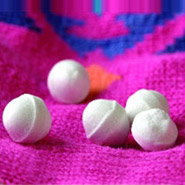|
 Mothball compound found to increase Asthma risk Mothball compound found to increase Asthma risk
The results of a new study suggest that if anyone at home has asthma or a respiratory illness, you should be using fewer air fresheners and deodorising products, particularly those that smell like mothballs.
The study found that a chemical compound present in many air fresheners, toilet bowl deodorants, mothballs and deodorising products may be harmful to the lungs.
The study examined the relationship between blood concentrations of 11 volatile organic compounds (VOCs) and lung function in 953 adults.
VOCs are chemicals in the form of gas that come from thousands of commonly used products including tobacco smoke, pesticides, paints, varnishes and cleaning products.
The study examined participantsí blood for levels of VOCs, and concluded that only one VOC (1, 4-dichlorobenzene) was associated with reduced lung function. This particular VOC was present in the blood of 96% of the adult participants.
This VOC is a white solid compound that smells like mothballs. It is used to control moths, molds, and mildew, and to deodorize restrooms and waste containers. Although this VOC is common in indoor environments, little is known about its effects on human health.
Researchers warn that even a small reduction in lung function may indicate some harm to the lungs. Further studies will be needed to properly evaluate the effect of this VOC on respiratory disease.
Remember: It may be best to limit the use of products that smell like mothballs around those who have asthma or other respiratory illnesses.
Source: Environmental Health Perspectives August 2006
http://www.ehponline.org/members/2006/9019/9019.pdf
|